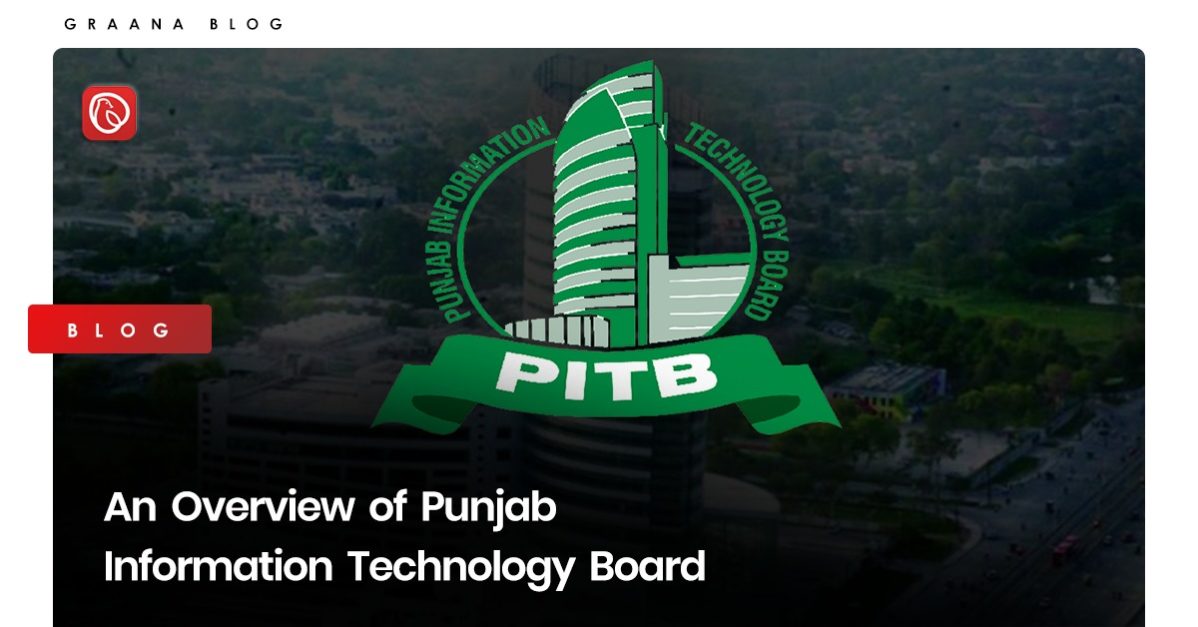
The Punjab Information Technology Board (PITB) is an autonomous body established by the Government of Punjab, aimed at fostering a digital revolution in the province, encompassing health, law & order, education, agriculture, transport, and citizen services through various initiatives. This organisation is dedicated to introducing technology and innovation to every sector in Punjab.
Graana.com has prepared a detailed guide about Punjab Information Board and its services below.
The Punjab Information Technology Board’s various efforts have led to the seamless integration of technology into day-to-day life. Established in 1999, PITB has implemented over 270 projects between 2012 and 2017. This brought about a digital revolution in the province and, thus, improved public services.
The government of Punjab established PITB to foster prosperity in the province by implementing cutting-edge IT solutions. Previously a part of the IT Department, PITB is now a division of the Planning & Development Department of Punjab.
The headquarters of PITB is in Lahore, on the 11th floor of the Arfa Software Technology Park (ASTP) on Ferozepur Road. For inquiries, you can reach out to a representative at its official number: 042-35880062.
The main objective of the board is to establish a digital Punjab and provide its services in various sectors. These include health, law enforcement, education, agriculture, livestock, food, and transport, as well as offer various citizen support services both within and outside the province.
Additionally, PITB encourages young entrepreneurs and offers various platforms for their growth. The organisation also conducts workshops, training programs, seminars, and conferences centred around the IT industry.
In the health sector, PITB has implemented notable projects such as the Biometric Attendance System. These track the attendance of health professionals at facilities across the province, and the e-Vaccs smartphone app. These also enable vaccinators to monitor attendance and keep real-time records of immunisations.
Moreover, PITB also developed an Electronic Medical Record (EMR) & Hospital Information Management System (HIMS) for the Hepatitis Prevention and Treatment Centre (HPTC) at the Pakistan Kidney and Liver Institute (PKLI).
Moreover, this system covers various aspects of patient care, including registration, billing for consultations and diagnostic services, pharmacy automation, waste management, payroll generation, and more.
PITB plays a crucial role in maintaining law and order by executing several projects. One such project is the computerisation of Complaint Management Systems (CMS) at police stations in Punjab. This streamlines the process of registering, verifying, and investigating complaints.
PITB also introduced a CNIC-based system to digitise criminal records. The system includes names, photos, and criminal history of individuals, thereby creating comprehensive criminal profiles. These profiles are now accessible at all police stations in Punjab through a centralised system.
In addition, PITB has created a comprehensive database for tenants to keep track of tenancy contracts. The process involves registering each new tenant with the local police station to monitor the tenancy status of the property and ensure that no one with a criminal record is renting it.
PITB contributes to eLearn Punjab, a platform that enables online learning across the province through a web-based platform and an Android app.
For more information on school records, performance metrics, and admission processes, visit the website of the School Education Department powered by PITB.
PITB has initiated several innovative projects in the agriculture sector. These include issuing Kissan Cards to farmers, creating a Smart Food Licensing System for the Punjab Food Authority, and developing a database for livestock farmers.
PITB has developed two traffic-related systems, the Traffic Violation Reporting System app for issuing e-challans and the Driving License Issuance Management System (DLIMS) for easier licence issuance and renewal.
Moreover, the organisation has also created the Motor Transport Information Management System (MTMIS) for vehicle registration and verification by the Excise, Taxation, and Narcotics Control Department of Punjab. Additionally, the Raasta App, offering travel-related services such as route planning and e-licensing, is available to all residents of Punjab.
With the support of the Punjab Information Technology Board, a range of services have become more accessible to citizens. These include the e-stamping of legal documents, the establishment of e-Khidmat Centers throughout the province, and the creation of the ePay Punjab app, among others.
PITB has also developed an Online Jobs Portal for Punjab, along with a variety of apps and web-based portals. These allow citizens to register their businesses, provide feedback, and register complaints.
The Punjab Information Technology Board provides a range of technology support services. These include data centres, office automation systems, training sessions, and data warehousing, to support the operations of various government departments and functions. These services aim to optimise the performance of offices throughout the province.
The Punjab Information Technology Board has also assisted with automation projects for government entities outside the province.
These include the automation of the Federal Ministry of Religious Affairs and Interfaith Harmony’s Hajj process, the development of a Monitoring and Evaluation System for the National Accountability Bureau (NAB), the replication of the eVaccs app for Balochistan and Khyber Pakhtunkhwa, and assistance to the Sindh Police in their transition to IT-based systems.
This is just a brief summary of the services provided by the Punjab Information Technology Board aimed at transforming the province into a digital hub. It highlights the significance of technological advancement and digitisation in streamlining processes, improving accuracy, and making them more user-friendly.
For more related information, visit the Graana blog.
ISLAMABAD: The Capital Development Authority (CDA) and the Asian Development Bank (ADB) have entered into…
Islamabad: The Capital Development Authority (CDA) has announced plans to issue possession letters to allottees…
Islamabad, [24 March 2025] – Graana.com, Pakistan's leading online real estate marketplace, is proud to…
Islamabad, Pakistan – March 2025: Graana.com, Pakistan’s leading real estate platform, has proudly partnered with…
KARACHI: Sindh Local Government Minister Saeed Ghani chaired a meeting on Monday to review measures…
ISLAMABAD: The Capital Development Authority (CDA) has unveiled plans to develop a modern food street…